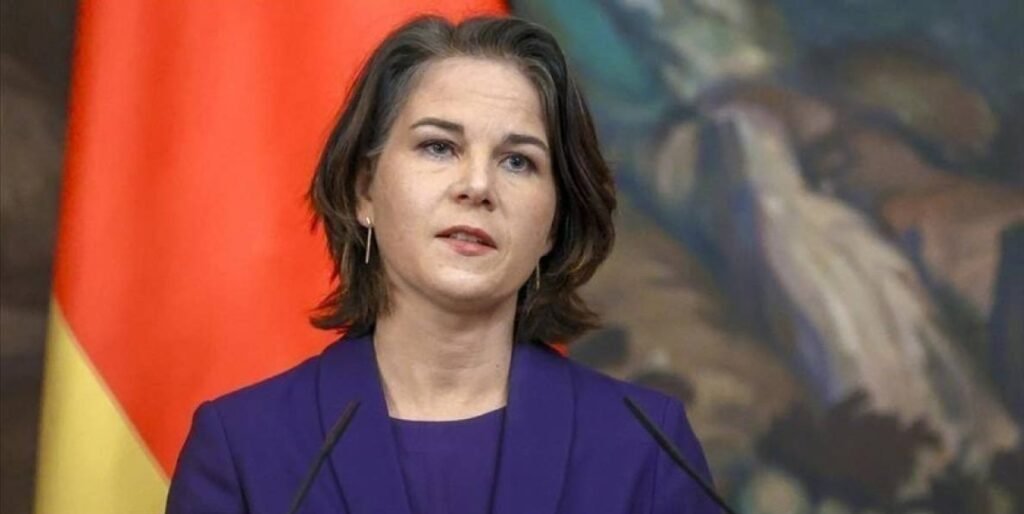German Foreign Minister Annalena Baerbock has called upon the global community to actively engage in Gaza, focusing on safeguarding civilians once the ongoing conflict between Israel and Hamas concludes. In an interview with reporters, Baerbock conveyed her concerns and proposed a crucial role for the international community in ensuring the well-being of the civilian population post-conflict.
You can also read: PM Sheikh Hasina’s Resounding Call for Ceasefire Urged in Gaza
Baerbock is pushing for more international involvement after her recent trip to Israel, her third since the conflict erupted on October 7. After the attack of Hamas in Israel, that caused the loss of 1,200 lives and the abduction of around 240 people, Israel, in response, launched a significant aerial and ground operation in Gaza. The continuation of Israel’s attack so far resulted in a devastating toll of over 13,000 lives, according to the Hamas-run Health Ministry.
In her conversation with reporters, Baerbock defended Germany’s position against a prolonged cease-fire. She stressed the crucial need to prioritize delivering humanitarian aid to the distressed population in Gaza. This emphasis aligns with Germany’s commitment to addressing the immediate needs of those affected, indicating a nuanced approach post-conflict.
International responsibility crucial for Gaza’s stability post-conflict
“To ensure security, we need international responsibility,” Baerbock asserted in her conversation with reporters. Drawing parallels with previous conflicts, she highlighted instances where the international community played a pivotal role in ensuring stability and protection. Baerbock drew insights from the wars in Europe’s Western Balkans, emphasizing the need for international responsibility in situations where trust is eroded, and heinous crimes have been committed. She noted similarities in the Middle East, signaling a call for global collaboration to address the complex dynamics in the region.
The global call for an immediate cease-fire has sparked varied viewpoints, notably with Germany, the United States, the United Kingdom, and the European Union favoring shorter “humanitarian pauses.”
Explaining this perspective, Baerbock highlighted the intricate balance needed for a cease-fire. She pointed out that for it to happen, both Israel and Hamas must agree to stop shooting at each other. This presents a challenge as it would mean Israel relinquishing its ability to defend itself amidst the ongoing missile attacks.

Baerbock advocates for Gaza’s safety and critiques settlement policy
Annalena Baerbock has underscored Germany’s collaboration with the United States and several Arab nations, emphasizing their collective commitment “to do everything possible to ensure the people in Gaza have safe places where they won’t be killed, where they can access clean drinking water, medication.” In a collaborative effort, these nations are working towards creating safe havens for the people in Gaza to address immediate humanitarian needs.
During her recent visit to Israel, Baerbock delivered a crucial message to the Israeli government, underscoring the importance of protecting the people in Gaza. In her recent journey to Israel, Annalena Baerbock didn’t hold back on delving into the core of the Israeli-Palestinian conflict, shining a light on the Hamas. Alongside Israel, the European Union, the United States, and a cohort of other nations, Baerbock also lebeled Hamas as a “terrorist organization, though the case is not exactly like that. As Hamas is fighting for the political emancipation of Palestine, leaders of the wests are continuously trying to pull their leash, showcasing a pure hypocrite nature.
However, her focus extended beyond diplomatic formalities. Baerbock passionately emphasized that the everyday people in Gaza—men, women, and children—should not bear the brunt of blame for the ongoing strife.
Taking a direct and personal approach, Baerbock didn’t step away from expressing her reservations about Israel’s settlement policy in the West Bank. Citing international law, as interpreted by the International Court of Justice, she made it abundantly clear that this policy crosses a line. In her face-to-face discussion with Prime Minister Benjamin Netanyahu, she urged him to step up and take decisive actions against the violent attacks carried out by Israeli settlers on Palestinians in the West Bank.
However, Baerbock’s engagement goes beyond voicing concerns. She passionately stressed the necessity for Israel not just to condemn settler violence but to actively pursue criminal charges.
In essence, Baerbock is carving out a reputation as a vocal advocate for the well-being of the people in Gaza. This is more than a surface-level examination; she’s taking a deep dive into the intricate web of issues in the West Bank.
Germany’s ‘reason of Israel state’
In the face of criticism directed at Germany’s support for Israel, Baerbock found it “extremely unsettling.” She pointed to Germany’s historic and moral responsibility to the Jewish people and the Israeli state, a responsibility stemming from World War II and the atrocities committed during the Holocaust.
Baerbock affirmed Germany’s commitment to international law and emphasized the dual commitment to German responsibility, showcasing a nuanced stance on the complexities of the conflict.
And that means giving Jewish men and women, whom Germany had tried to annihilate under the Nazi dictatorship, a safe country. That is the state of Israel, and that’s why Israel’s security is Germany’s ‘reason of state,'” she said.
The concept of “reason of state” or “Staatsräson” resounds as Germany asserts its steadfast dedication to Israel, positioning this alliance as integral to the very fabric of Germany’s contemporary existence.
Annalena Baerbock, highlighting Germany’s support for Israel state, emphatically stated, “In no way does our support contradict our commitment to international humanitarian law and the universality of human rights.” She underscored the equal value of every life, expressing deep concern over the distressing images of Palestinian children that weigh heavily on her conscience, while also acknowledging the anguish of the thought of Israeli children being subjected to abduction.
German support for Two-State Solution echoed
Earlier this month, the German government has reaffirmed its commitment to a two-state solution while underlining the immediate need to prioritize Israel’s protection. A government spokesperson stated, “We can’t give up on [a two-state] solution because there hasn’t been a better idea over the last 30 or so years.” The aspiration for an independent Palestinian state remains a crucial impetus for the involved parties as they navigate potential resolutions for the post-conflict era.
However, opinions on the viability of the two-state solution vary within Germany. Previous calls to support an independent Palestinian state have faced criticism from both government and opposition lawmakers, as well as the Central Council of Jews in Germany. President Josef Schuster voiced skepticism, deeming such calls unrealistic due to the absence of a “serious representative on the Palestinian side.”
Acknowledging the intricacies of the matter, a government spokesperson admitted that promoting a two-state solution isn’t an immediate priority. The spokesperson remarked, “the long term does not matter” in the midst of the “pressing crisis.” The current focus, according to the spokesperson, is squarely on addressing the root cause of the conflict.
Against this backdrop, Germany faces internal controversy over the conflict. While the government remains a key ally of Israel and vocally supports its Gaza counter-offensive, recent solidarity marches across the country drew criticism. Some participants displayed anti-Semitic and Islamist messaging, prompting concerns and condemnation from various quarters, including the German Council of Muslims.


